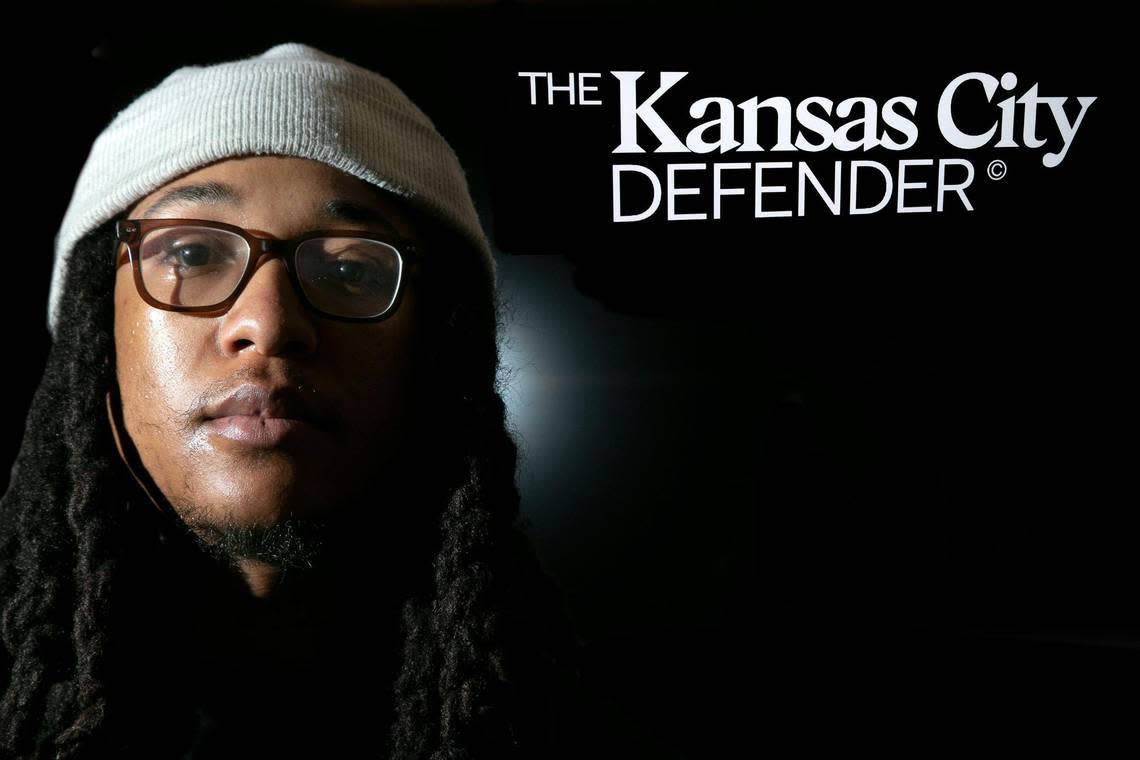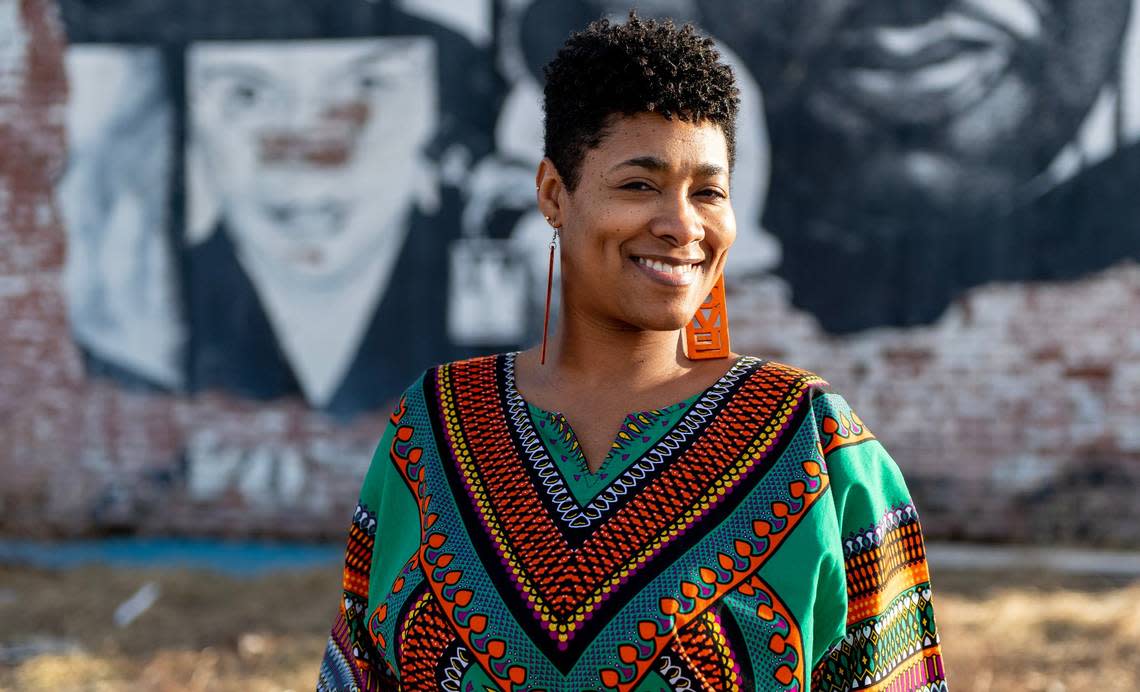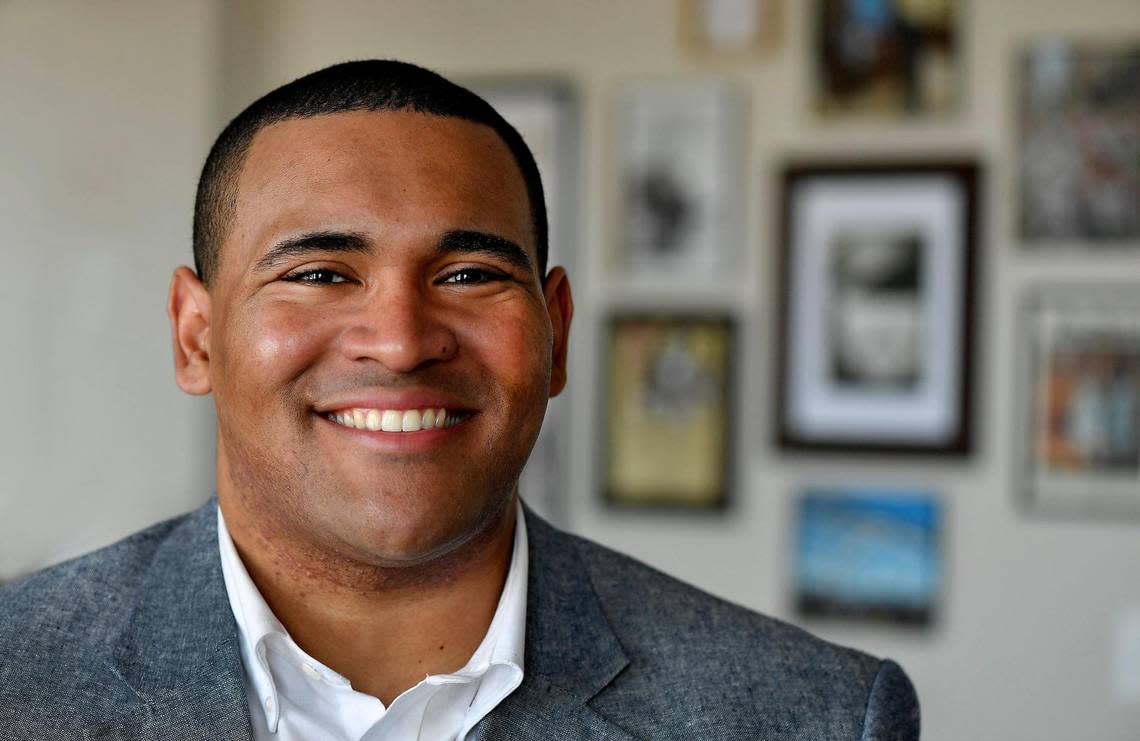Pushing for change: How four young Black leaders are trying to make KC a better place
During Black History Month, which ends Tuesday, the focus often is on the past. And for good reason: The contributions of Black pioneers in areas such as music, sports, politics, food and fashion have long been intertwined within the DNA of Kansas City.
But it’s also worth noting what is happening today and the figures who are looking to the future and pushing for change. Like the pastor bringing youth back to the faith. A radical community journalist. A woman fighting for reparation, and a Gen Z crusader for LGBTQA rights.
Together, they are examples of a new generation of Black leaders who are working toward building a stronger Black community. We asked them to tell their stories:
Armour Stephenson III, City of Truth Church
Armour Stephenson III lost his parents in a plane crash in 2005 and suddenly had to take over as pastor of Parkway Baptist Church. He wanted to create something new. So he set out to reconstruct the Black church experience and reach more people.
Stepping on stage in a hoodie and jeans instead of the typical suit and tie to deliver his Sunday sermon, Stephenson does not initially strike the image of a Black preacher.
Taking a line from Scripture, Zechariah 8:3, Stephenson renamed the church to City of Truth to signify a new beginning. At first, members left the congregation, but Stephenson was not deterred from moving forward into the unknown.
“With all the transitioning we had been through and all the devastation and all the grief, I just felt like there was a time for a shift and a changeover,” Stephenson said. “We wanted to be a place of truth, a place of life and freedom. A place where people from all over the city from different walks of life were able to come to one well in one place and begin to worship the name of Jesus.”
The church set out with a willingness to try new things to make City of Truth non-denominational and more inclusive, aspects as simple as welcoming people to come in street clothing and accepting members of all lifestyles without judgment. Stephenson believes that people will not care how much you know until they know how much you care.
“My focus is the urban core, obviously with Black and brown people,” he said. “We want to be that place of strength and that helping hand when we can be. We are heavily involved with outreach. That is one of our pillars. Love God and loving people.”
In his nearly 17 years as pastor, Stephenson (affectionately known as AD3) has established himself as one of the most trusted and respected ministers in the urban core.
The 38-year-old husband and father of four stands among a proud history of Black leadership from the clergy. Men of faith such as Martin Luther King Jr., Jesse Jackson and Ralph Abernathy all emerged on the front lines in the fight for freedom. And there are examples locally, such as Emanuel Cleaver II, the former mayor and current congressman.
Stephenson, who, like MLK, grew up in the church as the son of a preacher, learned that the pulpit was a natural training ground for Black leaders.
“Church has historically been an institution where people could develop their skills. Leadership skills were honed, organization skills were honed and community relations skills were honed,” he said.
While some may argue that the Black church has lost the influence it once had during the civil rights movement, the pastor believes the church is as integral to the struggle as ever. So, while some may get disheartened, Stephenson gets motivated to work even harder to reach the people of his community and show them the church has not forgotten them.
“I am an avid Kansas Citian. I love everything about Kansas City and it is the greatest place in the world. I am just passionate about people. I have seen my life change through changed people. I am passionate about my city and my people, I am passionate about knowing what God wants to do in people’s lives,” Stephenson said.
As one of the first local pastors to use social media to tap into a younger audience, Stephenson has amassed tens of thousands of followers, reaching people who may never have walked into a church. As a result, City of Truth boasts veteran members there before the name change, new members and people watching online, getting a feel for the vibe of the service.
With the church’s growth and programs geared toward community and youth outreach, Stephenson hopes to restore the faith in the Black church as a vital institution within the Black struggle.
“Leaders need to know how to communicate to their audience. Those skills were cultivated in the confidence of the Black church and still are until this day,” Stephenson said. “Frail humans fall victim to becoming egocentric, and so we have to do as best of a job as we can to put up safeguards and not believe the hype about ourselves.”

Ryan Sorrell, The Kansas City Defender
The Black press has long given a voice to stories that may have historically been overlooked in mainstream media. Like many other Black news resources, The Call newspaper in Kansas City covered news from the point of view of the people it was directly happening to.
In recent years, Kansas City has witnessed the emergence of a new Black news organization that has gained fame in the Black community while receiving some criticism from detractors.
“It’s a credibility thing just being a startup and especially being on social media,” said Ryan Sorrell, founder and editor-in-chief of The Kansas City Defender online news site. “A lot of people have this outdated look about social media not being credible. So we have had to — and I think it’s been frequently said for Black people — that you have to be twice as good to get half the credit.”
The 27-year-old Lee’s Summit native started the online publication in 2021 after seeing injustices brought against members of the Black community. While in college at Loyola University in Chicago, Sorrell started a Black student newspaper called The Black Tribune, which would spark his future endeavors in community journalism. After returning to Kansas City and experiencing the Black Lives Matter protests, Sorrell believed it was time to start a news outlet tailored to the Black public.
“Now we have established a national reputation. We still are targeted and attacked, and there are many attempts to discredit us. There will always be an ongoing challenge when it comes to news outlets like ours that are unapologetic and radical,” he said.
The Kansas City Defender won the 2022 Community Engagement Award from Local Independent Online News Publishers, and this year Sorrell received the MLK Community Service Award given by the Southern Christian Leadership Conference of Greater Kansas City.
While The Defender has its share of critics, Sorrell believes his duty lies with the Black community and no one else.
“People are used to news outlets that allege to be objective. We are rooted in the history of the Black press,” Sorrell said. “They might call us biased, but we say we are biased on the side of justice. A lot of people may say we don’t verify things. We verify things by the community, not from the police.”
His nonprofit startup has developed a faithful online presence and went viral recently, reporting on a video in which a Kansas City, Kansas, police officer was seen allegedly under the influence. Sorrell believes that many news outlets rely too much on information provided by law enforcement while dismissing the word of the people in underserved communities.
“We value the voices of people in the community before anything. For a lot of people, that is a radical departure from traditional journalist norms. That is something we are OK with, and all of our supporters are and that is why we have such a strong following. People who don’t like it just won’t like it,” he said.
While the organization is still in its relative infancy, it has managed to implement an impressive assortment of outreach programs through its community board. Over a dozen passionate members from various walks of life tackle issues including race, youth, education, housing and LGBTQA.
This year The Kansas City Defender started a new array of programming, such as its clothing giveaway for those in need, basketball tournaments for kids and open mic nights to provide local artists a place to perform.
Sorrell, unbound by traditional news standards, feels his only responsibility is to keep the Black community informed and ask the questions people want answers to.
“We are not a news outlet, we are a community organization,” he said. “Nobody can censor us and nobody can tell us what to say. Black people don’t have many platforms that are willing to speak the uncensored truth about the reality of our city. Being able to articulate the truth of what Black people experience is all so rewarding.”

Janay Reliford, KC Reparations Coalition
Janay Reliford has worn many hats in her long list of work in the Black community. In addition to her full-time career as a social worker, she founded Camp CHOICE (children having opportunities in created environments) to provide learning and enrichment experiences to middle and high school youth.
A woman with a big dream, Reliford hopes to open a youth development park and a Black business building for commerce and networking.
The 46-year-old KC native has been working to provide a change in the metro for the past 23 years, and with her work with the city’s newly founded Reparations Coalition, she hopes to get those resources out to those who sorely need them.
The conversation for reparations has been taking place for over a century, remembering the promise of “40 acres and a mule,” which were supposed to be awarded to formerly enslaved people.
“It is critical and important, honestly I think it is biblical,” Reliford said. “There was an appointed time that African peoples endured in this land and it has to be repaired. We never had an opportunity to heal from the generations of atrocities. We are still in it.”
Through her work with the Reparations Coalition, she hopes to develop a practical plan to help provide compensation via institutions dedicated to assisting the Black community. The 13-member coalition is working on pinpointing areas in education, health care, employment, business and housing.
One hurdle that Reliford and her cohorts believe they face is the public misconception of reparations.
“It takes so much education with this. A lot of people, even Black people, don’t understand what reparations are. People think about a check, but we have to be realistic about what resources are available,” she said.
Reliford wants to create long-term change to close the wealth gap — opportunities for Black residents to obtain higher education, home ownership and resources to start businesses. Even something as simple as making genealogical services available for Black families to uncover their often-unknown histories.
“We need to get to the root of our identity, I think that is a reason for a lot of the dysfunction in our community. We don’t know who we are. From chattel slavery to Jim Crow to now mass incarceration and we have this huge wealth gap. That’s how we repair the entire nation,” she said.
While the movement’s slogan is “Reparations Now,” Reliford is conscious that the end goal will take time. She says some members of the Black community think reparations are a pipe dream that will never happen.
“I believe that change will come through the process,” Reliford said. “It is discouraging when you hear the people who think reparations are not warranted. I want to hear the rationale on why anyone would believe why it isn’t owed. It is not something from the past, it is something that is ongoing.”

Justice Horn, Kansas City LGBTQA commission
LGBTQA leaders are often left out of Black History Month conversations due to social stigma within the Black community.
Only recently did residents learn the story of Lea Hopkins, who helped bring the first Pride Parade to Kansas City. Young leaders like Justice Horn have worked to bring those issues out of the shadows and into the light.
“Change is supposed to be uncomfortable because what change does is challenge the status quo,” Horn said. “When you have some people who ruffle feathers and challenge what we have, it is needed.”
Horn, 24, is the chair of the city’s LGBTQA commission. One of the youngest people working in City Hall, Horn is blazing a trail for other Gen Z activists to pump new blood into the fight for equality. Horn was enthralled by his activism as student council president at the University of Missouri-Kansas City, so after he graduated in 2021, he set out to make a career crusading for human rights.
“One thing I realized when I was first getting into this work is that you are not meant to be liked by everyone. But what people should know about you is that your work means something and where you stand,” he said.
Horn has received hate mail and criticism but does not let it get to him. Driven by a robust set of personal values to stand up for the underrepresented, Horn has helped pass city resolutions such as LGBTQA Pride Month, making Juneteenth a city holiday and creating Indigenous People’s Day.
As a Black gay man, Horn must combat LGBTQA issues in the white community as well as homophobia from within the Black community. He has found that many residents still have outdated and ignorant viewpoints.
“For some reason we are ashamed in the Black community of our gay brothers and sisters and folks who are trans. Even in the LGBTQ community we have anti-Black sentiment and racist sentiments in communities that are so diverse.”
Though still new to the struggle, Horn has received numerous awards from the city for his work. Horn credits people like longtime community leader Alvin Brooks and Gwendolyn Grant of the Urban League of Greater Kansas City as heroes he admired and emulated. Hopeful for the future, Horn thinks that in time people will understand that oppression of all people affects us as a society as a whole, and we must lend aid, even if we don’t think it is our fight.
“I am definitely not the first, but I am the first to do so in such an open way because of the people who had to sacrifice so we can be there,” Horn said. “I think they are intertwined. The Black liberation movement and the queer liberation movement is a dance.”
